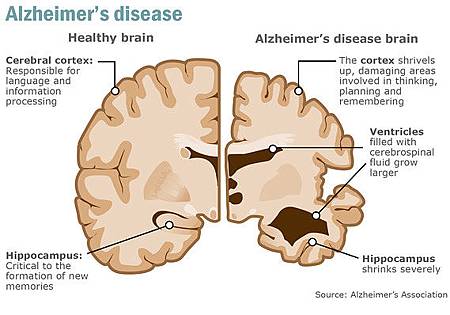
一個粗略的研究評估指出,全世界有多達三分之二的阿茲海默氏症案例來自於九種情況,這些常常是生活方式的選擇所造成。
包括肥胖(特別是身體質量指數高、肥胖跡象、中年)、頸動脈疾病,斑塊阻塞讓主要頸部動脈窄化並使得供應至腦部的血流減緩、高血壓、憂鬱、身體虛弱、教育程度差、天然產生的高半胱胺酸等胺基酸含量高、抽菸以及/或有第二型糖尿病(尤其是亞裔)。
這顯示,採取步驟減少或消除這些情況可能降低罹患阿茲海默氏症的長期風險;阿茲海默氏症這種大腦疾病會影響記憶力與思考力,是年長者最常見的失智症型式。
加州大學舊金山分校的神經專科副教授、阿茲海默氏症期刊資深編輯Jin-Tai Yu表示,他們的研究目前顯示的證據是,人會因為處理可改變的風險因子而獲益。
但Yu警告,這裡說的是阿茲海默氏症與任何一個因素之間有關連性,而不是有直接的因果關係。這代表如果減少上述九種情況之一,也無法確認能將預防阿茲海默氏症的機率增加多少。
Yu與同事們所做的這個研究結果刊載在8月20日的神經、神經外科、精神學期刊(Journal of Neurology, Neurosurgery & Psychiatry)中。
資料來源:http://www.24drs.com/
Native link:9 Factors May Be Key to Alzheimer's Risk
Up to two-thirds of Alzheimer's cases worldwide may stem from any of nine conditions that often result from lifestyle choices, a broad research review suggests.
Those include obesity (specifically, high body mass index, an indication of obesity, in midlife); carotid artery disease, in which plaque buildup narrows major neck arteries and slows blood supply to the brain; high blood pressure; depression; being frail; being poorly educated; having high levels of a naturally occurring amino acid known as homocysteine; and (specifically among those of Asian descent) being a smoker and/or having either type 2 diabetes.
The implication: Taking steps to minimize or eliminate such conditions might reduce the long-term risk for developing Alzheimer's, a brain disorder that affects memory and thinking. It is the most common form of dementia among seniors.
"The current evidence from our study showed that individuals would benefit from [addressing] the related potentially modifiable risk factors," said study lead author Dr. Jin-Tai Yu, an associate specialist in neurology at the University of California, San Francisco, and senior editor of the Journal of Alzheimer's Disease.
But Yu cautioned that "what is what is seen here is an association rather than a direct cause-and-effect relationship between any one factor and Alzheimer's risk." And that, he said, means it's impossible to determine exactly how much protection against Alzheimer's would be gained by the elimination of any one condition.
Yu and his colleagues discuss their findings in the Aug. 20 online issue of the Journal of Neurology, Neurosurgery & Psychiatry.
In all, investigators reviewed the findings of 323 studies completed between 1968 and 2014. Collectively, the studies involved more than 5,000 patients and looked at 93 conditions with the potential to affect Alzheimer's risk.
The team set out to determine which factors appeared to offer some protection against developing Alzheimer's.
On that score, the strongest evidence suggested that coffee, vitamins C and E, folate, NSAIDS (anti-inflammation drugs), statins (cholesterol-lowering drugs), blood pressure medications, and estrogen supplementation all appeared to reduce Alzheimer's risk.
Patients battling several serious health conditions also seemed to see their risk fall, including those with arthritis, heart disease, metabolic syndrome and/or cancer.
Those who were light or moderate drinkers of alcohol similarly saw their Alzheimer's risk dip, alongside current smokers (apart from those of Asian descent), those struggling with stress, and seniors with high body mass index.
By contrast, a complex statistical analysis enabled the research team to zero in on the nine factors that appeared to elevate Alzheimer's risk among 66 percent of those who ultimately get the disease.
But Dr. Anton Porsteinsson, a professor of psychiatry and director of the Alzheimer's Disease Care, Research and Education Program at the University of Rochester School of Medicine in Rochester, N.Y., suggested that to his mind, "there's not a lot of surprise here."
"It's an interesting paper," he said. "And certainly this review validates a number of individual studies that have previously shown an association between Alzheimer's and the factors they're identifying." But it doesn't improve understanding of the causes, he added.
The take-away, Porsteinsson said, is that a healthy lifestyle matters. Paying attention to blood pressure and cholesterol levels as well as exercise are all beneficial, and the other factors studied may make a difference, he added, but it doesn't mean there is a simple way to reduce Alzheimer's risk. Large clinical trials have looked at behavior modifications that might help, but those kind of simple interventions have failed.
"So reducing risk is probably not going to happen by just taking a pill or a food supplement or a single medication," he added. "That kind of a shortcut answer just doesn't have a lot of support."






 留言列表
留言列表
 線上藥物查詢
線上藥物查詢 